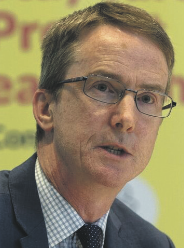David Lynch examines the recent report on the public health response to Covid-19 and what it means for the reform programme
In September, the long-awaited report of the public health reform expert advisory group (PHREAG) was published. The group was chaired by Prof Hugh Brady, President-designate of Imperial College London, UK. Prof Brady is the current Vice-Chancellor and President of the University of Bristol and former President of University College Dublin.
The group was asked to examine the public health response to the Covid-19 pandemic. Its report highlighted the fact that excess mortality was among the lowest in Europe and globally and that high vaccination rates were attained. “To the great credit of all involved, this was all achieved despite some weaknesses in our public health system in Ireland.”

Dr Douglas Hamilton
The Chair of the Irish Society of Specialists in Public Health Medicine (ISSPHM), Dr Douglas Hamilton, told the Medical Independent (MI) that the PHREAG report found that “Ireland, like most countries, was unprepared for a pandemic of this scale due to longstanding underinvestment in public health.”
“While Ireland responded well when we compare Covid case numbers and mortality, this was due to unprecedented collaboration, investment, individual effort across the system, and strong population engagement,” Dr Hamilton told MI.
However, Dr Hamilton warned that much of the collaboration and needed investment “is now being eroded”. He said that this is “leaving us with an overburdened health system that is struggling to cope with demand, which is going to increase sharply over the coming years”.
Dr Hamilton noted that “significant reform” is underway in public health in Ireland. “However, measures beyond this will be required.”
He said these measures would need to sufficiently support the “preventive, promotive, and protective capacities” of public health.
Dr Hamilton pointed out that the report made recommendations on the actions necessary to build the public health system’s “resilience and strengthen pandemic preparedness”.
The recommendations include strengthening the focus on public health within the Department of Health and to “embed the focus, coherence, and representation of public health in the HSE”. The report also recommended that the Chief Medical Officer (CMO) and the public health lead in the HSE “should work closely together”.
Dr Hamilton said the ISSPHN welcomed the recommendations, “specifically those regarding the system-wide strengthening of the structures and the workforce that ensure the delivery of public health.”
He said the Society appreciated that the report highlighted the need for a comprehensive strategy encompassing the World Health Organisation’s essential public health functions.
Recommendations concerning the requirement for greater public health leadership within the HSE, and “the investment in adequate information and communication technology to better manage programmes and evaluate outcomes, and the need to prioritise reducing health inequities in our society” were also welcomed.
“These cannot be achieved without cross-department and cross-sector collaboration and coordination,” Dr Hamilton emphasised.
He added that implementing the recommendations will need funding.
“But what more essential investment can there be than in the nation’s health and wellbeing?”
New agency
The report also made a specific organisational recommendation for “the creation of a new public health body, Public Health Ireland, which would sit under the aegis of the Department of Health”.

Dr John Cuddihy
According to the report: “This body would take on advisory and some operational functions relating to health protection, health promotion, and health intelligence, with an initial focus on preparedness for future pandemics and other health threats.”
On its publication, the Minister for Health Stephen Donnelly said Ireland responded “very well” to the pandemic, “and the report confirms this.”
“However, we must be ready for future unknown health threats. This new agency will ensure strengthened preparedness, by consolidating existing expertise across the health service together with additional resources.”
The Minister has since announced that Prof Mary Horgan will lead the design of the body. A proposal on the scope and functions of the agency will be brought to Government within six months.
The PHREAG’s additional recommendations are “currently being considered” by the Minister and officials, a Department spokesperson told MI.
The head of public health in the HSE said that the agency would not impact the current public health reform programme that is underway.
Dr John Cuddihy, National Director of Public Health, HSE, was speaking last month (14 November) during the Policy Forum for Ireland online conference, ‘Next steps for Sláintecare reform.’
Replying to questions from MI, Dr Cuddihy welcomed the PHREAG report. He said that he meets “regularly” with the CMO Prof Breda Smyth and held a “recent workshop with several public health colleagues in relation to the development of a public health strategy”.
“That would be a high level cross-governmental inter-sectional strategy for public health. That was one of the recommendations in the report and we are trying to act on that.”
Furthermore, he said it was “very clear” from his discussions with the Department “that the current public health reform programme in the HSE will continue to competition”.
Dr Cuddihy said the aim of the PHREAG report was to “strengthen and enhance” public health.
He said that the report’s recommendation “is for a health threats agency” for pandemic preparedness “but that wouldn’t take from the reform programme that is well underway in the HSE.… It will add greater focus to planning and pandemic preparedness… as a learning point out of the Covid pandemic.”
Uncertainty
As doctors and policymakers continue to assess the report’s findings, Dr Hamilton said that “there is some uncertainty within the public health community with regards to the development of an external and narrowly focused threats agency as proposed by the Minister”.
Dr Hamilton said there was a “lack” of clarity regarding the governance structure of the new agency and how it would integrate with the reformed public health system.
“Further clarification and consultation with our members and the broader public health community is imperative at this stage, and we urge the Minister, CMO, and senior leadership within the HSE to engage with the public health community to leverage the expertise of those delivering public health at the frontline.”
Consultants
Alongside these developments, a busy schedule of reform continues, which includes the appointment of 84 public health consultants across the system. The creation of these new consultant-grade posts followed a May 2021 ballot of IMO public health specialists who approved the terms of an agreement reached with the Department of Health.
As previously reported in MI, there has been some slippage regarding timetable targets. However, overall, the HSE said that the process “is well underway” despite targets being “stretched”.
Phase one of consultant recruitment is fully complete with 34 posts filled. Phase two, under the original terms of the agreement, was to see 30 posts filled by June 2023. This was still ongoing at the start of last month. By the beginning of November, of the 30 posts due to be filled, there were 19 posts onboarded; three candidates at pre-employment and contracting stage; six whole-time-equivalents (WTEs) at interview stage; and two WTEs currently being advertised.
One WTE post failed to fill at first round and is in the process of being re-advertised.
Phase three of the original agreement was to see an additional 20 post filled by the end of this year. Phase three is “now active in tandem” with phase two, the HSE spokesperson explained, “following approval of the positions at the August CAAC (consultant applications advisory committee).”
“One WTE is at offer stage with an existing panel; four WTEs are at pre-clearance stage; 10 posts are advertised with [the Public Appointments Service]; and five positions are awaiting advertisement.”
In September, Dr Anne Dee, Chair of the IMO public health committee, told MI that there had been a few delays “here and there”, but that “recruitment is continuing apace”.

The process had not been “an easy one”, said Dr Dee, noting that the application process “is in itself stressful, as indeed is the amount of change taking place”. However, she added that “hopefully” the process would be completed early in 2024, and “people can begin to really contribute to meaningful reform” in public health medicine in Ireland.
During the summer, the ISSPHM informed MI that it also believed the recruitment process was proceeding satisfactorily.
The Society noted it was “an enormous undertaking in terms of recruitment of a large number of consultant doctors over a relatively short period of time”.
The HSE said it continues to make every effort “to meet the very ambitious targets for completion of consultant recruitment”. Its spokesperson confirmed that the targets have been impacted by the introduction of the Sláintecare consultant contract, “in conjunction with the requirement for a phased approach to onboarding in an effort to protect frontline health protection services.”
However, there is positivity within the leadership of the HSE regarding the progress of public health reform.
“It has been one of the great success stories,” HSE Chief Clinical Officer Dr Colm Henry told this newspaper.
Speaking to MI at the HSE National Doctors Training and Planning (NDTP) medical workforce conference on 9 November, Dr Henry said: “We have public health, pre-pandemic, demoralised with long standing grievances over their pay and conditions, over their lack of recognition as status as consultants.”
Following the 2018 Crowe Horwath Report on the Role, Training and Career Structures of Public Health Physicians in Ireland, Dr Henry said there had been significant progress in the area.
He noted this has included funding support and “we have implemented a single integrated public health structure led by Dr John Cuddihy”.
Dr Henry said that the HSE is “well on our way” to the target of recruiting 84 new public health consultants including a number of “lead” roles.
“It’s not just about the delivery of a public health workforce,” he said, “it’s what that delivery means to the Irish population and that couldn’t come at a better time when we are establishing regional healthcare areas.”
Specific expertise will be needed to examine “the [health] needs of Limerick, the needs of Cork, the need of Galway”, etc. He said the “experts who can deliver” this type of population planning “are not hospital consultants, they are public health specialists who can determine the population healthcare needs [of a region]”.
In September Minister Donnelly noted the new public health consultants and referenced “242 staff hired under the public health reform programme”. He said that an additional 89 staff had been allocated to the Health Protection Surveillance Centre to enhance the national infectious disease surveillance system.
What do the health regions mean for public health?
The six new health regions are due to commence in February. Last month, Mr Liam Woods, HSE National Director, told the National Doctors Training and Planning medical workforce conference in Dublin that the roll-out of these new structures would mark a “significant date” for the Executive.
Leading figures in both the Department of Health and the HSE told Medical Independent (MI) that public health consultants are expected to play an important and leading role in the roll-out of health regions and the resulting structures.
The specific role of public health doctors “would be better understood” after the appointment of the six regional CEOs, according to Mr Muiris O’Connor, Assistant Secretary, Research and Development and Health Analytics Division, Department of Health. However, he confirmed that they would “have a very central role”.
Mr O’Connor was speaking last month during the Policy Forum for Ireland online conference on Sláintecare reform. He was addressing the health regions and answered questions from MI on the role of public health consultants.
“The kind of population-based approach to developing health and wellbeing, the emphasis on preventative health, it is something that we feel the new structures are a much more effective platform to give effect to…,” he said. “So they [public health consultants] will have very significant roles.”
He explained that exact detail of the governance layer below the regional CEOs, is “being hammered through at the moment”.
“[HSE CEO Mr] Bernard Gloster I think intends to give the successful candidates [regional CEOs] an opportunity to give views before their finalisation.”
Speaking at the same conference, National Director of Public Health, HSE, Dr John Cuddihy, told MI that public health consultants would have a role within the senior ranks of the new regional areas.
He said that there are currently six area directors of public health across Ireland. They are involved in the “planning and preparation” of the six new health areas before the appointment of the CEOs.
“It is, I think, important that those area directors can follow through to being on the senior management teams of those regional health authorities.”













Leave a Reply
You must be logged in to post a comment.